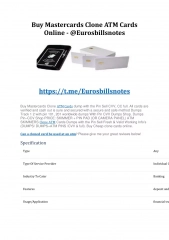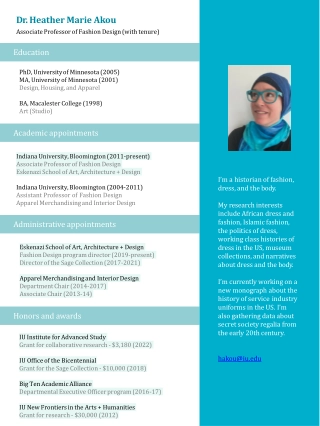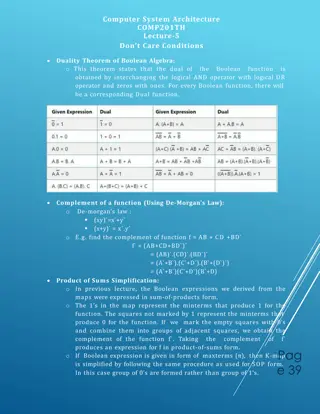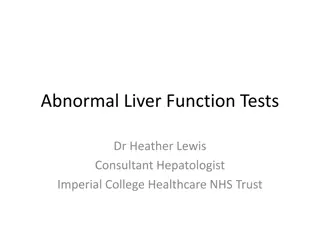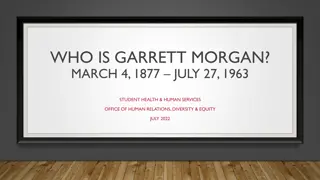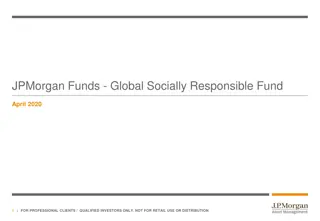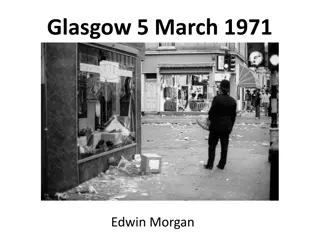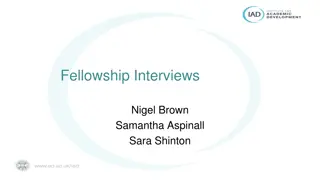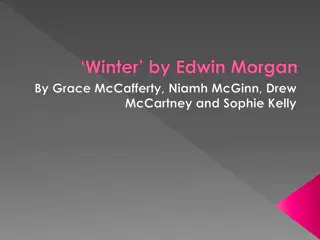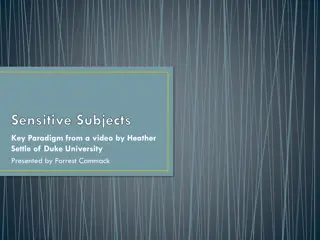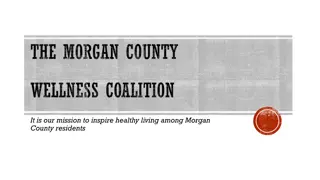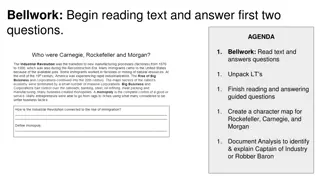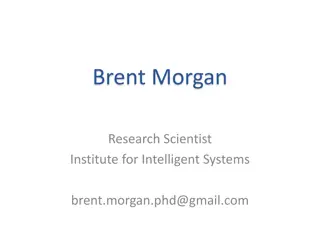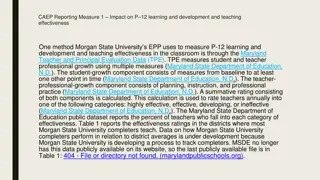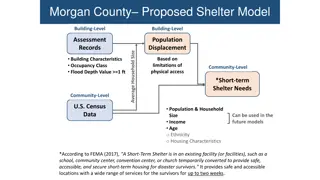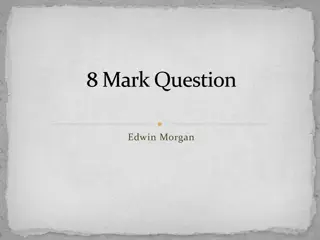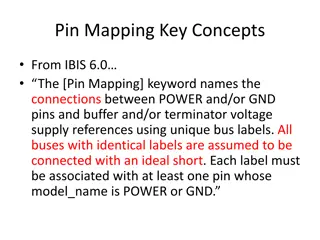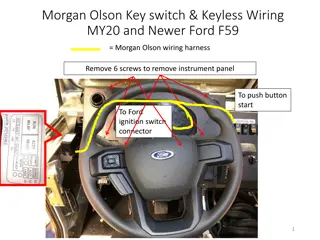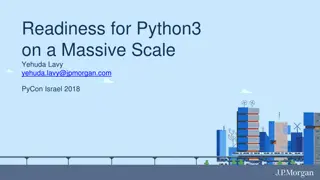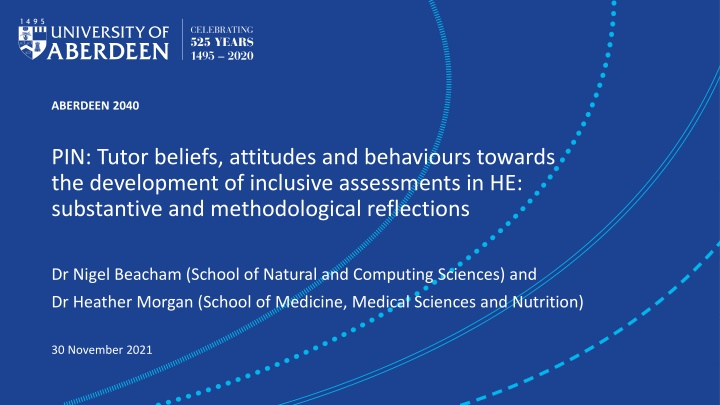
Exploring Inclusive Assessment Practices in Higher Education
"Discover the research project at the University of Aberdeen focusing on tutor beliefs, attitudes, and behaviors towards developing inclusive assessments in higher education. Learn how inclusive education principles are reshaping assessment practices to promote equality, diversity, and transparency for all stakeholders."
Download Presentation

Please find below an Image/Link to download the presentation.
The content on the website is provided AS IS for your information and personal use only. It may not be sold, licensed, or shared on other websites without obtaining consent from the author. If you encounter any issues during the download, it is possible that the publisher has removed the file from their server.
You are allowed to download the files provided on this website for personal or commercial use, subject to the condition that they are used lawfully. All files are the property of their respective owners.
The content on the website is provided AS IS for your information and personal use only. It may not be sold, licensed, or shared on other websites without obtaining consent from the author.
E N D
Presentation Transcript
ABERDEEN 2040 PIN: Tutor beliefs, attitudes and behaviours towards the development of inclusive assessments in HE: substantive and methodological reflections Dr Nigel Beacham (School of Natural and Computing Sciences) and Dr Heather Morgan (School of Medicine, Medical Sciences and Nutrition) 30 November 2021
Background One of the University of Aberdeen s (UoA) 2040 strategy principles underpinning its refreshed commitments is that inclusion will guide its education, research and projects (UoA, 2021). This includes Secur[ing] the highest standards of equality, diversity and inclusion, achieving accreditation across multiple strands and characteristics. ABERDEEN 2040
Background Whilst great effort and progress is being made to enhance policy and practice to support such commitment, little if any attention seems to be focused on student assessment. However, this is important to consider if the University is intending to also widen access and care for the health and wellbeing of staff and students because fair and transparent assessment is central to equality, diversity, health and wellbeing. ABERDEEN 2040
Background Providing student assessments aligned with inclusive policies and practices should ideally provide learners with assignments that embrace equality and diversity in all its facets and provide students, tutors, Schools and accreditors with the confidence that their procedures and assessments are fair and transparent for all. ABERDEEN 2040
Definitions: Inclusive Education and Pedagogy Inclusive pedagogy addresses three interrelated problems of educational inequality: (1) those that are associated with organisational and pedagogical strategies based on bell curve distributions; (2) the identification of additional support needs; and (3) the disproportionate statistical representation of certain minority groups in special education. (Florian, 2015) Inclusive education is considered a process of increasing participation and decreasing exclusion from the culture, community and curricula (Booth and Ainscow, 2002) ABERDEEN 2040
Aim In providing an alternative to the bell curve thinking that underpins traditional approaches, often choice of learning and support is offered based on what is generally available (Florian, 2015) Why not assessment? The project aims to explore Tutor beliefs, attitudes and behaviours towards the development of inclusive assessments in Higher Education with a view to identifying good practice to develop and use inclusive assessments. ABERDEEN 2040
Methods phase 1 Our research has used a combination of validated questionnaires deployed in think aloud interviews with staff to ascertain staff beliefs, attitudes and behaviours around inclusive assessment across STEM disciplines. Online survey (SNAP online questionnaire) Semi-structured interviews Semi-structured interviews (Video-recorded MS Teams meeting with screenshare) ABERDEEN 2040
Validated survey tools Brown and Fallon s Instructor Self Assessment for Multicultural and Global Education instrument (2010, pp. 20-21) HE centred Patitsas, Berlin, Craig and Easterbrook s Human Interpretation of Distributions instrument (2020, pp. 91-98) Computing Science centred Beacham and Rouse Inclusion and Inclusive Practice Instrument (2012) Initial Teacher Education centred ABERDEEN 2040
Think aloud interviews http://viis.abdn.ac.uk/snapwebhost/s.asp?k=161417872155 Talk aloud whilst completing survey Observations The survey comprises four sections: SECTION A: Perceptions of inclusive education [30 items, 10 minutes] SECTION B: Beliefs and attitudes towards student grading [23 items, 7 minutes] SECTION C: Views towards assessment development [30 items, 10 minutes] SECTION D: Further thoughts, experiences and/or comments you wish to share regarding inclusive assessments and their development, including examples of best practice [1 item, 3 minutes] ABERDEEN 2040
Substantive findings quant Dataset consists of 7 participants Piloted data analysis Data analysis Demographics Descriptive Inferential ABERDEEN 2040
Substantive findings quant What science discipline do you typically teach? Q8 Frequency Percent Valid Percent Cumulative Percent Valid Biology Chemistry Computing Medical 100.0 100.0 1 2 2 1 14.3 28.6 28.6 14.3 14.3 14.3 28.6 28.6 14.3 14.3 14.3 42.9 71.4 85.7 100.0 Q8 30 25 Other 1 20 Percent Total 7 15 10 5 0 Biology Chemistry Computing Medical Other ABERDEEN 2040 Q8
Preliminary findings quant How large are your typical classes? Q9 Q9 Frequency Valid Percent Cumulative Percent Valid 100+ 5 16-50 2 100.0 100.0 Percent 80 71.4 71.4 71.4 28.6 28.6 100.0 60 Percent 40 Total 7 20 0 100+ 16-50 Q9 ABERDEEN 2040
Preliminary findings quant How many years have you been teaching? Q10 Frequency Percent Valid Percent Cumulative Percent Valid 10+ 7 100.0 100.0 100.0 Q10 120 100 80 Percent 60 40 20 0 10+ Q10 ABERDEEN 2040
Preliminary findings quant Inclusive practice (Brown and Fallon, 2010) QInc2 Frequency Valid Percent Cumulative Percent Valid -18.00 1 -14.00 4 -12.00 1 -4.00 1 100.0 100.0 Percent 14.3 14.3 14.3 57.1 57.1 71.4 14.3 14.3 85.7 14.3 14.3 100.0 Total 7 ABERDEEN 2040
Preliminary findings quant Beliefs and attitudes towards grading in science education: norm-referenced standardised grading (Patitsas, et al., 2020) SciEdGrading2 Percent Valid 47.50 2 100.0 100.0 Frequency Valid Percent Cumulative Percent 28.6 28.6 28.6 60.00 2 28.6 28.6 57.1 62.50 2 28.6 28.6 85.7 72.50 1 14.3 14.3 100.0 Total 7 ABERDEEN 2040
Substantive findings qual n=7 ~ 60- minutes duration for each meeting Participants from: School of Natural and Computing Sciences; School of Medicine, Medical Sciences and Nutrition; School of Biological Sciences ABERDEEN 2040
Substantive findings qual 12:37 I suppose it's looking at different celebrations and days of festivals are happening and also the linkages between them perhaps , or the relevance , you know , even if we don't identify the specific thing ourselves , the relevance of celebrating and for all . 12:57 I think so . I mean , sending out messages of congratulations for aid , which is one example I think I'm supervising co supervising a student who's Muslim . And during Ramadan , we were very much aware that she was getting tired . And and we were we were asking how she was getting on in terms of energy and so on and recognising , you know , some of the challenges of being fasting . 06:26 so I do when I get opportunities to attend workshops and so on , I will definitely try to do that . And a good example of that is the recent students deep dive . Yes , so hearing from students from the disability . Students Forum , that's the correct title , that was quite an amazing session , actually , and just hearing the experience from Dani , from the students was important and I've also attended . Workshops and meetings for people who are working with , you know , disability coordination in the university . 08:46 08:47 painfully aware of that , so I'll give that a one . I try to prevent any prejudice or stereotype thinking from unfairly influencing my expectations of students . Yes , that's one that's something I've worked on , worked very hard on over a number of years . I promote conversation take the need to dispel and prejudice the stereotypes , misconceptions among students . I really do try my best . I if I'm being brutally honest , I would say no to it because then again , I'm very careful . So , for example , even though I am teaching XXX, which is purely abstract subject , sometimes I try to instil in my examples , for example , certain views or opinions , or I would recommend some reading and I would get comments later from the students in the feedback form saying this is a XXX course . Why are you and why are you being a social justice warrior ? 06:29 05:06 because I've done the university training , the required training , and also as a disabilities coordinator , I tend to make an extra effort to become informed , I guess you could say trained . 05:22 05:22 ABERDEEN 2040
03:31 03:33 So for my personal professional development , I feel comfortable discussing racial and disability issues with people of other races and abilities as well as my own . I would say frequently no to . Yeah . I read books to articles increase my understanding , particular aspirations and frustration , people definitely number one . Do I add to my answers or do I just stick to the 03:58 03:59 you can stick to it or if you've got a particular thought that comes into your mind while you're doing it , then please feel free to share with it somebody else just . The more I read , the more . So here's the thing , English is not my first language , and I'd like to think that I'm proficient in it , but as you know , language evolves . And of course , you know , when I read about other people's experiences , sometimes let's say new vocabulary comes up and it's very difficult for me to keep track with the vocabulary that is being used . And the reason I ask the number two for the first question as I am worried about offending someone if I don't use the right vocabulary . And sometimes , you know , I , I look at the vocabulary and I might relate to it , but I can't use it because I don't think it's applicable to me . And sometimes I might disagree with the vocabulary myself . But then again , I don't feel comfortable voicing these opinions because I come from a place of privilege 04:05 04:08 04:13 04:30 04:32 04:46 04:48 ABERDEEN 2040
05:41 If there is no[thing] I wouldn't say I have the training I have to teach myself . So I would say three occasionally . I am not professionally trained . I use my colleagues expertise to extend my own knowledge and skills as well . Diversity , yes , to . I am very cautious about using other people's experiences because again , their experience does not come from a place of words . 04:40 04:50 04:51 And two on that one . It's an interesting yeah , probably no higher than three . I'm afraid for that . Because , no , I've never been formally trained at all in terms of this area , even though it is so important , obviously . Yeah . 05:01 05:02 05:02 12:33 12:34 12:39 12:43 12:46 12:47 12:51 12:52 12:53 OK , yeah , so in the in the new regime of synchronous sessions , I can be a one now . That might have been a two or even a three in the old days when it was a struggle sometimes to get students to engage and actually kind of contribute . ABERDEEN 2040
20:46 Some students are innately predisposed to do better . Oh , yes . That's definitely the five . I want the opposite . Yeah , I , I wholeheartedly agree , wholeheartedly agree assessments should be aligned with the university . No , I disagree . Disagree . I strongly disagree . Yes , assessment grades . You should account for the best of our students graduate graduating . I strongly disagree . So number five , that the negative assessments rubric should be used . Oh , my God . Number four , I hate those rubrics . Your assessment group is I come from number four again , right next year . 20:59 21:00 21:05 21:06 21:28 21:31 26:56 27:04 27:07 Assessment that should be aligned with the university's graduate attributes . To . And I'm not saying one just because I think sometimes it would be a struggle to achieve that alignment , but it's a good aspiration and it can often be achieved . 27:19 measuring of students , graduate attributes , skills and qualities . Assessment grading should account for the measuring of students . Yes , because that would be an inherent part of the assessment , if it's a well designed assessment , so I'll give that a one assessment rubric should be used . Yes , one assessment rubrics should ABERDEEN 2040
43:45 And one for that . So know , most of my courses , I tell the students that I am looking for a median mark of 16 , what used to be B two and and that . I don't engineer the assessments . While I'm marking them , I mean , I try to achieve that , and obviously , if that's not achieved , I don't feel that rubric or anything like that . But yeah , they are aware that within the class , not everyone is going to get the highest mark . And we are looking for . We are looking for a normal distribution , ideally . 29:24 All my courses , yes . And so just remind me of the . And so one is all the time , right ? Yeah , almost always and forever and ever . OK , so . On a big class . Yeah , I'll give it to . So that one . OK , great , thank you . How about number two ? Probably for I think it's not completely impossible , but I would be worried if I saw that . OK , and number three , I'm not seeing a huge difference between the two , so can I just say four again ? 29:36 29:39 29:51 29:53 30:08 30:18 30:22 30:26 ABERDEEN 2040
20:28 20:31 Never , and there is one that we sometimes see in computing , which is . You either pass , you fail , but nothing in between . 24:08 24:09 24:10 And this is the distribution one I almost never see . 26:34 those because for some reason I'm trying to stop students of thinking this every single time . I would give an assessment , the first thing they asked me , what is my criteria ? How many marks do I get if I do this ? And I'm like , no , forget this . I wanted to have fun at the assessment and then I will later . 22:12 one would be very accurate representation of of my classroom , so I often see shaped distribution , one in my class . That would be number one . ABERDEEN 2040
39:04 And assessments can be developed to measure both student performance against others and standard criteria . I mean , you probably wouldn't want me to say it , but it seems like a loaded statement because it almost seems to suggest that we're expecting students to be pretty much constantly comparing themselves with others . And I wouldn't want that . But at the same time , I would want them to compare themselves against standard criteria , so just again , I'll compromise with three . 39:18 39:32 39:34 27:58 So what I do after each assessment is I let them see what other people have done without elaborating on the mark . And then I would tell them , you know , how would you grade this ? How would you rate this and talk to me about it ? And students love , love these exercises because when they see how other people do well or badly , they feel good about themselves . So I'm going to go with four . 27:40 not that I don't want them to achieve the highest grade , but there is a problem with the word should . Students should be able to compare their performance with other taking a course . 28:14 28:15 25:44 Assessment should be designed later . Yeah , it's the last ABERDEEN 2040
18:29 And regarding the final assessments , I look at how many students fall into each category . Yes , one . By Moodle , there is company belief that it is necessary to reflect it is a commonly held belief that it is necessary to reflect on the distribution grades of courses . 40:43 I mean , you should have some distribution , but you shouldn't try to artificially do it . 18:27 18:28 OK , histograms of my students final overall call . Yes I do indeed . So that's going to be a strongly agree . So that's something that's part of our kind of department kinda process . Just to kind Of see what the grade profiles are like Regarding assessments . I do . 18:33 18:34 18:35 18:39 18:40 18:41 18:44 18:45 35:02 35:06 Well , shouldn't you be able to compare the performance with others taking a course ? Oh , that's tricky , because then you get into all sorts of . Confusion and stuff . 35:14 ABERDEEN 2040
28:15 28:17 28:25 28:26 28:29 28:30 So now I think I have to disagree on that . So . You know , we are told that we must I think , indeed , you know , Mark , against the learning outcomes . Of course , sometimes if a student does produce an extremely good and creative answer , yes , you can just sneak in a couple of extra marks . 28:36 28:36 22:28 22:36 22:38 22:38 22:41 22:44 22:45 I got a rubric , so , again , X's demands for rubrics , so . I actually disagree with that and , you know , I prefer to take dare I use the word , a more holistic kind of approach rather than just one mark for this to market for that , etc. . 20:59 21:01 Well , this is getting more contentious , isn't it ? Innately predisposed . So does that mean they are just , quote , naturally clever , unquote ? ABERDEEN 2040
31:36 I suppose the question then goes , if you do alternative assessments , can you still allow students to compare themselves in that they . Yeah , OK , um . Make it three . I haven't I haven't needed to do that , but I hadn't thought about it either . 31:43 31:53 31:26 31:28 31:30 31:32 say they'll always be some people who crash and burn and just don't . Seem to be able to make these learning outcomes . But , you know , again , to use words like dumbing down , we can't just do that to a great extent . So I have to say here that , yes , I do agree . And even so , in some courses like first year , that's just not going to be the case . And so maybe an I don't agree , do I ? Yeah , just put a green there , please leave , hopefully got by my commentary as well to kind of give some context 35:17 35:19 35:20 35:25 35:27 35:29 35:30 35:32 We can't really sort of do it any other way . I don't think and . Again , some of my colleagues would just be freaking out if I thought of the idea of different students getting different assessments . So , yeah , 31:45 31:46 31:51 31:53 31:55 31:56 32:06 32:06 32:09 38:53 would be worried that that question gets interpreted in exactly the opposite way to what you just said , because my experience of one size fits all clothing is that it absolutely never fits . So and it is not a choose your own adventure . So assessments based developed on a choose your own adventure format . That sounds great . One size fits all does not sound like a good idea , even if that's how you're interpreting it . I don't I don't know if that's how everyone would interpret it or . I'll give that a three , because I don't know . I don't know what it's meant to mean , alternative assessments should be developed for students . For any reason ABERDEEN 2040
Methodological findings Undertaking interviews for the first deployment of the survey has helped us to understand how participants interpret the questions and scales Methodology showing potential Inclusive practice tending towards negative end of scale Science Education grading tending towards positive end of scale More analysis and investigation required ABERDEEN 2040
Summary Range of beliefs, attitudes and behaviours within and across disciplines Areas where more guidance or support would benefit have been identified Think aloud technique useful for eliciting interpretation of questions, which is not consistent Think aloud technique is resource intensive so could not be used for all participants required to get sufficient power from survey data Need for more data (and better validated survey tools!) ABERDEEN 2040
Next steps UoA volunteers for think aloud interview? UK wide survey phase 2 ABERDEEN 2040


